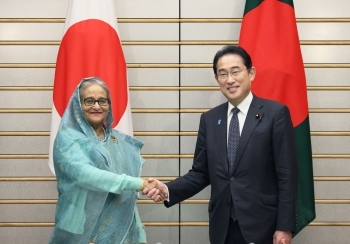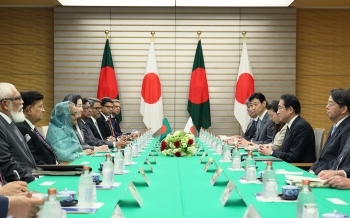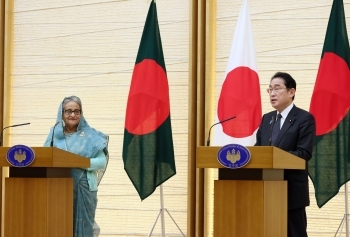Japan-Bangladesh Relations
Japan-Bangladesh Summit Meeting and Working Dinner
 (Photo: Cabinet Public Affairs Office)
(Photo: Cabinet Public Affairs Office)
 (Photo: Cabinet Public Affairs Office)
(Photo: Cabinet Public Affairs Office)
 (Photo: Cabinet Public Affairs Office)
(Photo: Cabinet Public Affairs Office)
On April 26, commencing at 6:40 p.m. for approximately 45 minutes, Mr. KISHIDA Fumio, Prime Minister of Japan, held a Summit Meeting with H.E. Sheikh Hasina, Prime Minister of the People’s Republic of Bangladesh, during her official visit to Japan, followed by an exchange of notes ceremony with the presence of the two leaders, and a joint press conference. The two leaders then had a working dinner from 8:00 p.m. for approximately 60 minutes. The overview of series of events is as follows.
The two leaders also issued a Joint Statement on Strategic Partnership between Japan and Bangladesh.
1. Introduction
Prime Minister Kishida welcomed Prime Minister Hasina’s visit to Japan and expressed his pleasure at elevating the relations with Bangladesh, which is at a strategic juncture, to a “Strategic Partnership” as the two countries marked the 50th anniversary of the establishment of diplomatic ties last year. Prime Minister Kishida also expressed his desire to further deepen the bilateral relations and to further cooperate with Prime Minister Hasina toward the realization of a “Free and Open Indo-Pacific (FOIP).”
In response, Prime Minister Hasina expressed her pleasure at being able to visit Japan this year, which marks the beginning of another 50 years of bilateral relations. Prime Minister Hasina also noted that Japan and Bangladesh have built friendly relations over a long period of time, and expressed her desire to further strengthen relations with Japan by elevating the bilateral relations from a “Comprehensive Partnership" to a "Strategic Partnership.”
2. Bilateral relations
- (1)Free and Open Indo-Pacific (FOIP)
Prime Minister Kishida explained that he announced the New Plan for a FOIP in March this year, and that the “Industrial Value Chain” concept, announced at that time, aims to improve the connectivity of the entire Bay of Bengal region. Prime Minister Kishida expressed his desire to create synergies by organically linking cooperation under the “Bay of Bengal Industrial Growth Belt (BIG-B)” initiative with the development of the North Eastern Region of India. Prime Minister Kishida also explained the National Security Strategy and other documents, and Prime Minister Hasina explained that while welcoming Japan’s commitment to a free, open, and rule-based international order, Bangladesh also places importance on a free, open, and inclusive Indo-Pacific including the announcement of its own Indo-Pacific Outlook. - (2)Security
The two leaders welcomed the commencement of negotiations on the Agreement concerning the Transfer of Defense Equipment and Technology, while confirming that port calls, unit-to-unit exchanges, and high-level exchanges are increasingly becoming active. The two leaders agreed to continue to promote security cooperation, including through the use of the “Official Security Assistance (OSA).” - (3)Economy and Economic Cooperation
Prime Minister Kishida congratulated Bangladesh on its graduation from the status of a Least Developed Country (LDC) in 2026, and stated that Japan will continue to support Bangladesh’s development. He also stated that Japan will consider providing financial assistance (yen loans [note]) to Bangladesh to support its economy, which has been affected by Russia’s aggression against Ukraine and other factors. In addition, Prime Minister Kishida requested that Prime Minister Hasina make efforts to improve the investment environment and advance industry so that Bangladesh can attract further investment. Prime Minister Hasina expressed her gratitude for Japan’s support over a long period of time and expressed hope for further expansion of Japanese companies into Bangladesh. The two leaders welcomed the progress of the Joint Study Group on the possibility of a Japan-Bangladesh Economic Partnership Agreement (EPA), the first meeting of which was held this month, and agreed to strengthen bilateral economic relations.
(Note) Yen loans: Cooperation through providing developing countries with necessary funds under flexible conditions (low interest rates and long repayment periods). As the funds are subject to repayment to Japan, effective utilization and self-sustaining development by recipient developing countries can be expected. - (4)People-to-people and cultural exchanges
The two leaders welcomed many cultural exchange programs that took place during the year of the 50th anniversary of the establishment of diplomatic relations between Bangladesh and Japan last year.
They also welcomed the progress of new initiatives, such as the first friendship city affiliation between the two countries, realized between Naruto City in Tokushima Prefecture and Narayanganj City; the resumption of direct flights between Narita and Dhaka; and the launch of local examinations for the specified skills system, and agreed to promote broad-based people-to-people and cultural exchanges.
3. Regional and international affairs
- (1)Prime Minister Kishida stated that, as the G7 Chair, Japan places importance on two perspectives: upholding a free and open international order based on the rule of law and strengthening relations with partners in the international community beyond the G7. Prime Minister Hasina explained her thoughts on key issues for the international community.
- (2)The two leaders discussed regional affairs, including those in the East and South China Seas, as well as responses to North Korea, including the issue of its nuclear and missile programs and the abduction issue.
- (3)Prime Minister Kishida stated that the international community must join forces to speak out and appeal for an early end to Russia’s aggression against Ukraine, which has shaken the very foundations of the international order. The two leaders agreed to oppose any attempt to unilaterally change the status quo by force or coercion anywhere in the world.
- (4)The two leaders also exchanged views on the issue of displaced persons from Rakhine State, Myanmar. Prime Minister Kishida expressed his respect for Bangladesh’s efforts to shelter displaced persons and his continued support for such efforts. Prime Minister Hasina expressed her gratitude for Japan’s support and explained the importance of their early repatriation to Myanmar.
- (5)The two leaders confirmed that they will continue to work together to strengthen the functions of the United Nations, including through the reform of the Security Council.
Prime Minister Hasina reaffirmed Bangladesh’s support for Japan’s bid to become a permanent member of the UN Security Council, and Prime Minister Kishida expressed his appreciation for the support. The two leaders also reconfirmed their commitment to continuing to work together on nuclear disarmament and non-proliferation.
[Reference]
Joint Statement on Strategic Partnership between Japan and Bangladesh (English(PDF) / provisional Japanese translation (PDF)
/ provisional Japanese translation (PDF) )
)

